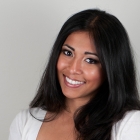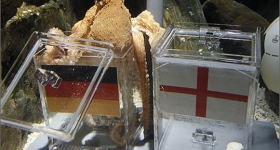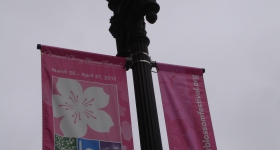Author Nadia Hussain catches actor Kal Penn while waiting for a shuttle at the Democratic National Convention in Charlotte, North Carolina.
Last April, I was sitting anxiously inside the top floor of
a union office while Democratic pollsters were scrambling to get the final vote
count through. When the numbers were posted, my stomach knotted with anticipation as I made my way to the piece of butcher paper with the top 5
vote getters for women, the ones who would make the cut to be delegates to the
2012 Democratic National Convention. My heart lept to my throat when I saw my
name with the number 3 next to it. I made it! I would be going to Charlotte in
September as an official delegate from the state of California.
Fast forward five months later and I was at the political
equivalent to the Superbowl. Even after a six hour flight, I couldn’t believe
that I was in Charlotte, that I was a delegate who would be watching President Barack
Obama and leading politicians speak live, and get to meet Democratic supporters
from all over the country. It was so surreal.
I roamed around in a hyper reality, where running into
celebrities and high-level politicians became part of my norm that week. While waiting for a shuttle, I looked over to
my right to notice a dapper looking Indian guy standing alone texting on his smartphone.
It took me two seconds to realize that I was staring at actor Kal Penn.
Needless to say I asked him for a photo, but even cooler than that, we had a
quick discussion about our involvements with national Asian and Pacific Islander (API) groups. I think I’m an even bigger Kal Penn fan now.
The celebrity/politico sightings didn’t stop there. As part
of the California delegation, running into people like Los Angeles Mayor Antonio Villaraigosa, or House minority leader Nancy Pelosi, became strangely
commonplace, as I shared my hotel with Hollywood celebrities and senators. I
saw Zach Braff grab coffee, I waved to Rosario Dawson in an elevator, and famed
labor organizer Dolores Huerta and I hung out while waiting in a restaurant
line for ribs. The experiences and stories go on and on, but it gives you an
idea of what the convention was like.
There was also a plethora of meetings and caucuses to
attend. I attended an API caucus meeting, where I was excited to see the lineup for API candidates from all over the country who were running for
congressional seats. Candidates like Otto Lee of California and Tulsi Gabbord
of Hawaii fired me up with their visions of a future with more diversity in Congress
and their focus on issues affecting API communities. I was also lucky to hobnob
with some of my biggest political heroes at the APIAVote party, where I had the
honor of networking with Congressman Mike Honda, Congresswoman Judy Chu and
Congresswoman Barbara Lee. It was inspiring to spend time with public servants
who blazed the trail for Asian Americans in the political sphere.
Muslim American involvement was another issue that I was
hoping to engage with at the DNC. I moderated a panel at the last minute that
included Congressman Andre Carson, the second Muslim to ever be elected to Congress. I also attended a luncheon hosted by Congressman Keith Ellison, the
first Muslim person to be elected to Congress, as well as the American
Muslim Democratic Caucus. At the
luncheon, it was noted that Muslim Americans have made great strides at this
year’s convention. The Washington Post
noted that in 2008, there had been only 25 Muslim delegates, while this year the
number quadrupled to 112. It was also noted that more work needed to be
done, to make sure that the Muslim American voice was engaged nationally and
heard when it came to policy decisions. I spoke to this very topic at a press
briefing hosted by the State Department, where I gave a presentation to a roomful of foreign
journalists on the political impact of Muslim Americans. Giving a press
briefing was a new experience for me, but I was proud and humbled to be given
the opportunity to speak about this community and their experiences.
That was the most beautiful aspect about this convention,
the fact that there was this opportunity to speak, to be included into the
fold, into the very fabric of this star-studded political event. This year’s DNC was well noted for its
diversity and it was an aspect that made a big impression on me as a delegate.
Even Mayor Villaraigosa, who served as
convention chair, made this point by saying during his
speech, “Look around you, everyone. This has been the most diverse, most
inclusive convention ever held anywhere in the United States of America.”
There were people of all colors, identities, ages and races.
I loved how everyone freely expressed themselves and greeted each other, as if
they were family, even if they had never met before. This inclusiveness impressed me. Though I did
not attend the Republican National Convention a week before, I had seen
pictures of the arena, which was largely homogenous.
I spoke to a Spanish journalist who had covered both conventions and she told me that “the Republican National Convention was like a
white page, the Democratic National Convention is like a box of crayons.”
Statistics support these observations. According to the
political blog Politicker, 40 percent of the approximately 5,600
delegates and 500 alternates at the DNC were minorities. Specifically, 27
percent of the delegates were African American and 13 percent were Latino. In
contrast, the Joint Center for Political and Economic Studies reported last
week that only 2.1 percent of the 2,286 delegates at the RNC were African
American. Many news outlets reported that 90 percent of the RNC delegates were
non-Hispanic whites.
This follows along with the national
picture. According to the Pew Research Center, 13 percent of Republicans are from
non-white groups, as opposed to 38 percent for Democrats. But the demographics of this country are changing. CNN reported earlier
this year that US minorities now represent 50.4 percent of America's population
under the age of 1. This will have a major implication for the future of this country, a future that, judging from the two conventions,
the Democrats have been embracing and Republicans are having a
difficult time adjusting to.
At this current moment, Democrats have been making
minority groups their base, with most groups overwhelmingly supporting the
current president. This pluralism was reflected in the caliber and diversity of
the speakers, from the first keynote speech by San Antonio Mayor Julian Castro,
to the myriad of Latino, Black and Asian American speakers that took the stage
to invigorate and fire up the crowd. As a South Asian, a Muslim, and most
importantly, an American, I felt my heart and my tear ducts swell with pride at
what I witnessed and experienced.
So when it comes down to it, I came
into the convention a bit uncertain as to what to expect, but walked away full
of hope for an America that is more inclusive. A future where minorities will become
the majority is almost inevitable, but power shifts and political empowerment
can in no way be taken for granted. If our communities do not engage with the
mainstream political structure, then we will get lost and have those who are
outside and out of touch with our communities make the decisions that will
impact our lives.
I was grateful to be included in spaces where I could connect
with leaders who were driving the way for a more inclusive future. I was
invigorated by being involved in meetings and discussions with delegates who
represented diverse groups. Now we must use this inspiration, this feeling of
hope, to empower our communities from the ground up. I feel very passionate
about engaging with not just API and Muslim communities, but with all emerging communities
to register to vote and to learn about our civic processes. I also hope that
more people from our groups take the step to run for office, at all levels of
the political spectrum.
Coming away from the convention, I can
see us engaging and rising to change the political and civic face of our nation,
but this will only happen if we work hard in ensuring that we have a place and
a voice at the table. It is up to us to make sure that our country is more
accurately represented by a box of crayons instead of a blank page.









Comments